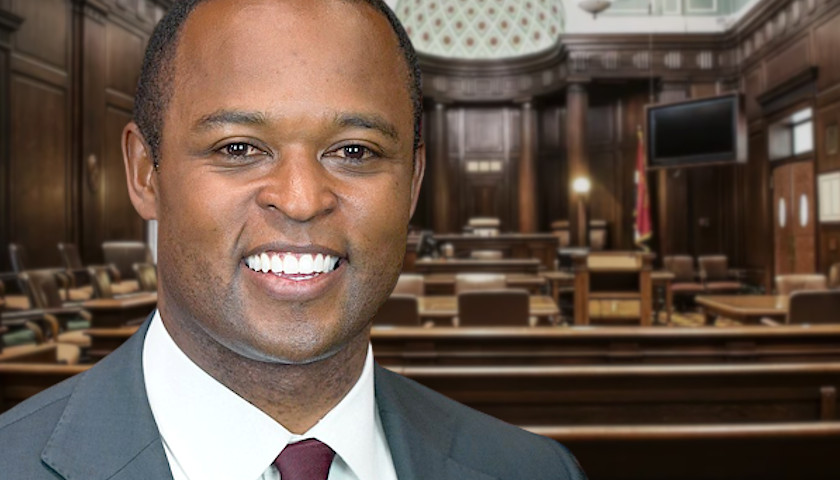Kentucky Attorney General Daniel Cameron quickly asked the state’s Court of Appeals to stay a circuit court’s ruling that temporarily blocked the enforcement of two state pro-life laws.
Cameron filed a Writ of Mandamus and Prohibition Thursday, requesting the Kentucky Court of Appeals lift a temporary restraining order against both the Human Life Protection Act, which bans nearly all abortions, and the Heartbeat Law, which prohibits the procedure once a fetal heartbeat is detected, generally at six weeks’ gestation.
We've asked the Court of Appeals to Reinstate Kentucky's Human Life Protection Act and Heartbeat Law. Read more: https://t.co/lUqoQOj4pS pic.twitter.com/iFY4R3vSCE
— Attorney General Daniel Cameron (@kyoag51) June 30, 2022
The restraining order allows abortions to resume while the constitutionality of the law is litigated.
“Every day that goes by that the Human Life Protection Act and Heartbeat Law are prevented from taking effect, more unborn lives will be lost,” Cameron said in a statement. “These laws represent Kentucky’s values and its support for life. We’re moving quickly to defend this important law and to have it restored.”
In his request for emergency relief, Cameron emphasized to the Court of Appeals the urgency of reinstating the pro-life laws:
Once an abortion has been performed, the life of that unborn child is over. No court order can bring that child back to life. To be sure, there are instances in which timing matters for an expectant mother who requires an abortion because her life is in danger. And the General Assembly has protected that expectant mother in such circumstances.
Earlier in the day, Jefferson County Circuit Court Judge Mitch Perry granted a request by the American Civil Liberties Union (ACLU) and abortion industry giant Planned Parenthood for the restraining order that temporarily blocked enforcement of the Human Life Protection Act and the Heartbeat Law.
On June 24, the U.S. Supreme Court held in Dobbs v. Jackson Women’s Health Organization:
The Constitution does not confer a right to abortion; Roe and Casey are overruled; and the authority to regulate abortion is returned to the people and their elected representatives.
The lawsuit against the pro-life laws states a restraining order is necessary “to prevent the immediate and irreparable harms to both Plaintiffs’ patients and the public interest that are occurring by the criminalization of abortion in the Commonwealth.”
The abortion activists argued in their lawsuit the pro-life laws “are imposing irreparable harm on Plaintiffs and their patients” by “forcing Kentuckians to remain pregnant, and eventually give birth, against their will.”
Cameron said in a statement after the circuit court blocked enforcement of the pro-life laws the judge has “without basis in the Kentucky Constitution, allowed two clinics to resume abortions.”
“We cannot let the same mistake that happened in Roe v. Wade, nearly 50 years ago, to be made again in Kentucky,” he said. “We will be seeking relief from this order.”
My statement on today’s court ruling, which temporarily stops enforcement of the Human Life Protection Act and allows two Kentucky clinics to resume abortions: pic.twitter.com/BCLn3Dxus9
— Attorney General Daniel Cameron (@kyoag51) June 30, 2022
The attorney general added:
The U.S. Supreme Court made it abundantly clear in Dobbs that decisions about the protection of life should be decided by the states and the people through their representatives. Our General Assembly clearly expressed Kentucky’s support for life by passing the Human Life Protection Act with bipartisan support. We will do everything possible to continue defending this law and to ensure that unborn life is protected in the Commonwealth.
The Human Life Protection Act, which made Kentucky the first state in the nation to be abortion-free since the U.S. Supreme Court created a right to abortion in Roe v. Wade, passed the state legislature in 2019.
According to Cameron’s office, the act “prohibits abortion in most circumstances.”
“Generally speaking, it states that no person may knowingly cause or aid in ‘the termination of the life of an unborn human being,’” the advisory, issued the day of the High Court’s ruling in Dobbs, noted. “Performing a prohibited abortion is a Class D felony, but pregnant mothers who receive an abortion are not subject to any criminal liability.”
The act also does not ban abortion when a licensed physician determines the procedure is necessary to save the mother from death or serious risk of death due to a physical condition.
– – –
Susan Berry, PhD, is national education editor at The Star News Network. Email tips to [email protected].





